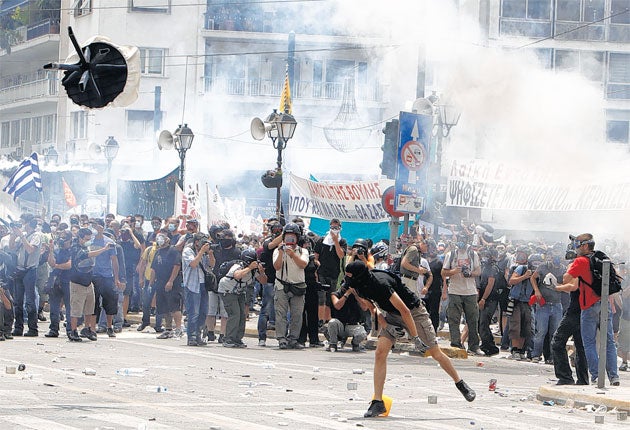As battle rages outside, Greek MPs usher in an age of brutal austerity
International markets climb following 'vote of responsibility'

Greece entered a new age of austerity last night with central Athens in flames, shops and businesses vandalised and police hunting hooded rioters through ransacked office buildings and the tourist district in the shadow of the Acropolis.
While Greek MPs were smuggled out of parliament after a narrow vote in favour of severe cuts, dozens of protesters were being treated at a field hospital set up in the metro station beneath them.
Earlier in the day, the Greek Prime Minister George Papandreou urged his party to avert the "country's collapse" and swallow a package of measures described by several economists as an economic "suicide pill". Outside in Syntagma Square, stun grenades and a relentless volley of tear-gas canisters was met with a barrage of rocks and petrol bombs by some of the protesters.
Internationally, the result was hailed as a "vote of national responsibility" by the European Commission and international markets climbed as the prospects of a rapid default that could rock the eurozone receded.
"In years to come, this vote may be seen as a turning point for Greece and the eurozone," Jerzy Buzek, the European Parliament President, said. "This was not an easy choice to make and I salute those who voted in favour of this tough reform package."
After three days of bitter debate in parliament, national strikes and mass protests the vote was carried by 155 to 138. A second austerity bill must also be passed today before Greece gets a €12bn (£11bn) loan it needs from the European Union and International Monetary Fund to avoid going bankrupt in mid-July.
Yesterday's violence brought an end – temporarily, at least – to the month-long occupation of Syntagma Square, which had become a campsite for the Greeks who call themselves "the indignants". Their best efforts to maintain a peaceful protest against an internationally mandated austerity programme were overwhelmed by clashes between 5,000 police and several hundred masked rioters.
Hundreds of police officers on motorcycles swarmed into the square after the vote and waves of stun grenades and tear gas were fired to clear out the remaining protesters.
The battleground at Syntagma, a square fringed by luxury hotels where sections of the international media have watched from the rooftops, has presented some surreal scenes. Few surpass the moment on Tuesday night when some rioters put down their stones to help police in body armour hunt for the severed finger of one of their colleagues. A bare-chested, tattooed protester eventually found the finger and signalled to officers, who wrapped it in tissue and rushed it from the scene.
Gripped by its worse recession since the dictatorship in the 1970s, Greeks now face bleak years of spending cuts and tax hikes while national assets are sold off in a privatisation programme designed to relieve the €600bn national debt. Youth unemployment is running at 35 per cent and climbing. There is little prospect of Greece finding the growth it needs to reverse the crisis, analysts said.
International lenders have lost all confidence in Greece, whose bonds have been downgraded by the rating agencies to junk status – making it the first highly developed economy to slump so far. A technical default is still seen by markets as a near certainty.
The main hope is that the political space won by painful Greek concessions to reform will open the way to a rationalisation of the country's debt burden without threatening the stability of Europe's banks or the credit rating of the zone's other heavily indebted nations. France has already agreed to stretch the terms of repayments to its banks and others may follow in the coming weeks.
The governor of Greece's central bank warned on the eve of yesterday's vote that a refusal to take the medicine prescribed by the IMF and the EU leadership would be tantamount to "suicide".
Such warnings have done little to convince broad sections of the Greek public or the opposition conservatives – only one member crossed the floor to back the austerity measures.
There are still serious concerns over the implementation of reforms, with many MPs telling their constituents that damaging cuts will be undone or ignored in practice. But the way should now be clear for a second €100bn bailout from the IMF, EU and European Central Bank.
The austerity package
The measures introduced by parliament yesterday are a mix of tax rises and spending cuts. They include:
* Tax increases of €2.02bn this year
* Reducing the public-sector wage bill, with a curb on hiring and the axing of all temporary staff. The government will replace only one in 10 workers who retire this year
* Slashing social benefits. Some benefits will be cut, others will be reduced through means-testing
* Campaign against tax evasion with rising sums targeted to be saved every year and more than €1bn in 2015
* Defence cuts of more than €1bn by 2015
* Health-spending savings, partly from cutting subsidised drugs
Join our commenting forum
Join thought-provoking conversations, follow other Independent readers and see their replies
Comments